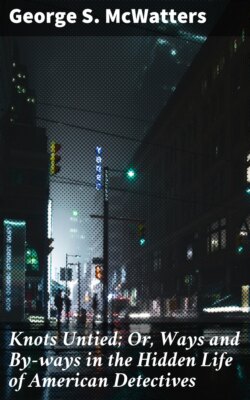Читать книгу Knots Untied; Or, Ways and By-ways in the Hidden Life of American Detectives - George S. McWatters - Страница 22
На сайте Литреса книга снята с продажи.
Officer McWatters in the late Civil War: His Foresight.
ОглавлениеTable of Contents
Officer McWatters' earnest love of, and reverence for the free institutions of the United States, are something extraordinary, it would seem. Reared in the north of Ireland, and having resided in London long enough to thoroughly understand the miseries of the subject-classes of that great metropolis and of England, Officer McWatters was prepared, when he landed on our shores, to render at least due appreciation to republican institutions; and when the late civil war broke out, he entered into the conflict against secession with all his soul. His anxiety to go to the front at the breaking out of the rebellion, and take a soldier's place in the struggle, was only equalled by the bitter regret that he was prevented doing so by untoward circumstances. But what service to the country he was thus forbidden to do upon the field, he fully rendered, in various forms, in his capacity as a most active and enthusiastic patriot at home. Officer McWatters was not of that "noble home guard," so justly and severely ridiculed at the time, who urged others on to the war, and felt satisfied with their achievements in so doing; but he was ever alert in the discovery of ways and means to serve the government, perhaps more effectively than if he had been in the ranks on the field, or had headed a regiment in battle; for if Officer McWatters had gone to the field, such are his temperament, popularity, and capacity, that he could not long have held a position second to that of many men who gained distinction and led New York regiments and brigades—to say nothing of superior leaders.
He was of the number of those (few, indeed, they may properly be said to have been), who, in the early part of the rebellion, took anything like an adequate preview of its results. It appears that, early in the war, he wrote a letter to the press, in which is clearly stated his opinion, that the war "can have no less result than the abolition of negro slavery." He was prepared for this: implicitly believing in it, he ordered his conduct thereby, and throughout the contest manifested an enthusiasm proportionate to the mighty victory for humanity which he so clearly foresaw was to be won.
